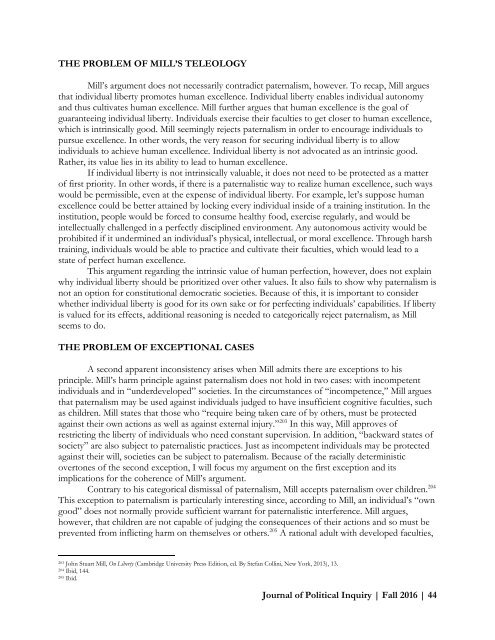Fall2016_Final2
You also want an ePaper? Increase the reach of your titles
YUMPU automatically turns print PDFs into web optimized ePapers that Google loves.
THE PROBLEM OF MILL’S TELEOLOGY<br />
Mill’s argument does not necessarily contradict paternalism, however. To recap, Mill argues<br />
that individual liberty promotes human excellence. Individual liberty enables individual autonomy<br />
and thus cultivates human excellence. Mill further argues that human excellence is the goal of<br />
guaranteeing individual liberty. Individuals exercise their faculties to get closer to human excellence,<br />
which is intrinsically good. Mill seemingly rejects paternalism in order to encourage individuals to<br />
pursue excellence. In other words, the very reason for securing individual liberty is to allow<br />
individuals to achieve human excellence. Individual liberty is not advocated as an intrinsic good.<br />
Rather, its value lies in its ability to lead to human excellence.<br />
If individual liberty is not intrinsically valuable, it does not need to be protected as a matter<br />
of first priority. In other words, if there is a paternalistic way to realize human excellence, such ways<br />
would be permissible, even at the expense of individual liberty. For example, let’s suppose human<br />
excellence could be better attained by locking every individual inside of a training institution. In the<br />
institution, people would be forced to consume healthy food, exercise regularly, and would be<br />
intellectually challenged in a perfectly disciplined environment. Any autonomous activity would be<br />
prohibited if it undermined an individual’s physical, intellectual, or moral excellence. Through harsh<br />
training, individuals would be able to practice and cultivate their faculties, which would lead to a<br />
state of perfect human excellence.<br />
This argument regarding the intrinsic value of human perfection, however, does not explain<br />
why individual liberty should be prioritized over other values. It also fails to show why paternalism is<br />
not an option for constitutional democratic societies. Because of this, it is important to consider<br />
whether individual liberty is good for its own sake or for perfecting individuals’ capabilities. If liberty<br />
is valued for its effects, additional reasoning is needed to categorically reject paternalism, as Mill<br />
seems to do.<br />
THE PROBLEM OF EXCEPTIONAL CASES<br />
A second apparent inconsistency arises when Mill admits there are exceptions to his<br />
principle. Mill’s harm principle against paternalism does not hold in two cases: with incompetent<br />
individuals and in “underdeveloped” societies. In the circumstances of “incompetence,” Mill argues<br />
that paternalism may be used against individuals judged to have insufficient cognitive faculties, such<br />
as children. Mill states that those who “require being taken care of by others, must be protected<br />
against their own actions as well as against external injury.” 203 In this way, Mill approves of<br />
restricting the liberty of individuals who need constant supervision. In addition, “backward states of<br />
society” are also subject to paternalistic practices. Just as incompetent individuals may be protected<br />
against their will, societies can be subject to paternalism. Because of the racially deterministic<br />
overtones of the second exception, I will focus my argument on the first exception and its<br />
implications for the coherence of Mill’s argument.<br />
Contrary to his categorical dismissal of paternalism, Mill accepts paternalism over children. 204<br />
This exception to paternalism is particularly interesting since, according to Mill, an individual’s “own<br />
good” does not normally provide sufficient warrant for paternalistic interference. Mill argues,<br />
however, that children are not capable of judging the consequences of their actions and so must be<br />
prevented from inflicting harm on themselves or others. 205 A rational adult with developed faculties,<br />
203<br />
John Stuart Mill, On Liberty (Cambridge University Press Edition, ed. By Stefan Collini, New York, 2013), 13.<br />
204<br />
Ibid, 144.<br />
205<br />
Ibid.<br />
Journal of Political Inquiry | Fall 2016 | 44
















